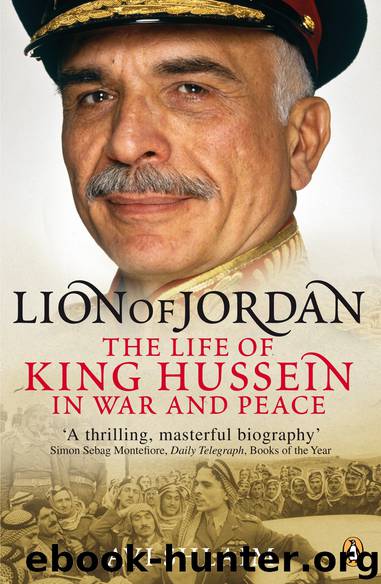Lion of Jordan by Avi Shlaim

Author:Avi Shlaim
Language: eng
Format: epub
Publisher: Penguin Books Ltd
Published: 2003-10-30T16:00:00+00:00
16
The October War
All diplomatic activity to resolve the Arab–Israeli conflict was suspended in the second half of 1972. Israel had no real interest in negotiating with any of its Arab neighbours; the principal aim of its policy was to preserve the territorial status quo on all fronts and make no concessions for the sake of peace. Underlying this was the assumption that the present state of affairs could be perpetuated indefinitely because Israel’s military power would deter the Arabs from going to war. Egypt, as the largest and most powerful of the Arab states, was the main target of the Israeli strategy of attrition. The essence of this strategy was to let President Sadat ‘sweat it out’, with his range of alternatives narrowing all the time, eventually, it was supposed, driving him to settle the conflict on Israel’s terms. Richard Nixon and Henry Kissinger, who replaced William Rogers as secretary of state, abandoned the effort to mediate between the Arab states and Israel. They adopted the Israeli belief that the stalemate in the Middle East served American as well as Israeli interests and that it worked against the Soviet Union and her Arab allies. With tacit American backing, Israel was free to pursue the policy that could fairly be described as ‘destination deadlock’.
In relation to Jordan too Israel’s leaders displayed no diplomatic flexibility and no interest in a peace agreement. Under the influence of Moshe Dayan, the Labour-led government continued to consolidate its military control over the West Bank and to build more and more settlements in the Jordan Valley. Practical cooperation with the Jordanian authorities continued over a wide range of practical issues, including agriculture, the management of water resources, trade, taxation, banking, electricity, the provision of medical services and the repatriation of refugees. Paradoxically, what Simha Dinitz described as the state of de facto peace enjoyed by Israel reduced the incentive to strive for a formal, or de jure, peace: functional cooperation between Jordan and Israel contributed to the diplomatic stalemate in the Middle East.1 Hussein was convinced that if this was not broken, the result would be instability, turbulence and, eventually, war. In early February 1973 he arrived in Washington to share his forebodings with President Nixon and other senior American policy-makers. Kissinger describes the king’s predicament with insight and sympathy:
Hussein repeated his willingness to make peace with Israel. But despite secret contacts he faced an impasse. Hussein symbolized the fate of Arab moderates. He was caught between his inability to sustain a war with Israel and his unwillingness to make a common cause with the radicals. He was prepared for a diplomatic solution, even a generous one, but Israel saw no incentive for negotiations as long as Hussein stood alone. Any return of conquered territories seemed to it less secure than the status quo. And the West Bank with its historic legacy would unleash violent domestic controversy in Israel – the National Religious Party, without which the governing coalition could not rule, was adamantly opposed to the return of any part of the West Bank.
Download
This site does not store any files on its server. We only index and link to content provided by other sites. Please contact the content providers to delete copyright contents if any and email us, we'll remove relevant links or contents immediately.
| Arms Control | Diplomacy |
| Security | Trades & Tariffs |
| Treaties | African |
| Asian | Australian & Oceanian |
| Canadian | Caribbean & Latin American |
| European | Middle Eastern |
| Russian & Former Soviet Union |
The Secret History by Donna Tartt(19088)
The Social Justice Warrior Handbook by Lisa De Pasquale(12190)
Thirteen Reasons Why by Jay Asher(8909)
This Is How You Lose Her by Junot Diaz(6886)
Weapons of Math Destruction by Cathy O'Neil(6279)
Zero to One by Peter Thiel(5801)
Beartown by Fredrik Backman(5754)
The Myth of the Strong Leader by Archie Brown(5507)
The Fire Next Time by James Baldwin(5444)
How Democracies Die by Steven Levitsky & Daniel Ziblatt(5218)
Promise Me, Dad by Joe Biden(5153)
Stone's Rules by Roger Stone(5087)
A Higher Loyalty: Truth, Lies, and Leadership by James Comey(4962)
100 Deadly Skills by Clint Emerson(4925)
Rise and Kill First by Ronen Bergman(4788)
Secrecy World by Jake Bernstein(4753)
The David Icke Guide to the Global Conspiracy (and how to end it) by David Icke(4717)
The Farm by Tom Rob Smith(4509)
The Doomsday Machine by Daniel Ellsberg(4490)
